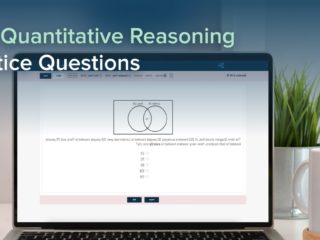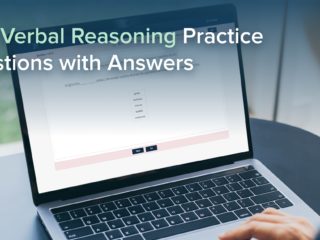Last Updated on January 22, 2024
People preparing for the GRE General Test to apply to graduate school typically know about some aspects of preparing for the GRE Verbal section. For instance, they may study vocabulary and learn strategies for answering Verbal questions. At the same time, there is another key ingredient of preparing for GRE Verbal that is less well understood. That ingredient is effective practice.
Practice is what takes us from merely knowing about GRE questions to being skilled in answering them quickly and correctly. Accordingly, understanding how to practice effectively can make a huge difference in the results of your GRE Verbal preparation. So, in this article, I’m going to cover four key tips on how to practice GRE Verbal to maximize the results of your test prep and achieve your GRE score goal.
Here are the topics we’ll cover:
- Tip 1: To Develop Strong Skills, Do Most of Your GRE Verbal Practice Untimed
- Tip 2: To Maximize Skill Development, Treat Every Verbal Answer Choice as a Question
- Tip 3: Develop Awareness of Whether You Have Solidly Supported Your Answer
- Tip 4: Master Choosing Between the Last Two Choices
- How to Practice GRE Verbal: Key Takeaways
- What’s Next?
Let’s begin by discussing an essential aspect of a good GRE Verbal study plan: untimed practice.
Tip 1: To Develop Strong Skills, Do Most of Your GRE Verbal Practice Untimed
The most powerful move students seeking to develop strong GRE Verbal skills can make is to do most of their GRE Verbal practice untimed.
In fact, one of my first questions for anyone having trouble with GRE Verbal score improvement is, “How much time do you normally spend on each practice question?” Often, the response is, “about one to two minutes.” In such a case, I know that we’ve found a key way for that person to achieve better results: by shutting off the timer and taking as much time as needed to fully understand each question and arrive at the correct answer.
This tip may surprise you, since the two GRE Verbal Reasoning sections give you only 18 minutes to answer 12 questions and 23 minutes to answer 15 questions, respectively. In fact, many GRE students think the best way to learn to answer questions on the GRE quickly is to answer them at test pace when practicing. However, untimed practice works much better than timed practice for developing skill in answering GRE questions at test pace. Let’s discuss why.
Why Untimed Practice Works Best
The reason you’ll be able to answer tricky Verbal questions in an average of 1:30 each on test day won’t be that you’ve raced through many GRE Verbal practice questions. The reason will be that you’re so skilled that you can readily answer questions at that pace. In other words, speed comes from skill, and the best way to become skilled is to practice untimed.
When you take all the time you need to fully understand a practice question and carefully use logic to answer it correctly, you give yourself time to develop strong skills. In other words, you give yourself time to learn to go through the motions that lead to success.
So, as you prepare for GRE Verbal, take all the time you need to carefully read the questions, note key words or phrases, and do whatever else it takes to get questions correct. In other words, shoot for complete understanding and high accuracy, regardless of how much time per question you need to do so.
TTP PRO TIP:
For best results, do most of your GRE Verbal Reasoning practice untimed.
Once you’re getting questions correct consistently, you can work on answering questions at test pace. Also, you’ll get timed practice when taking GRE Verbal practice tests.
Tip 2: To Maximize Skill Development, Treat Every Verbal Answer Choice as a Question
Our next tip reflects the following key difference between answering GRE Quant questions and answering GRE Verbal questions. In most cases, when answering a Quant question, we’re concerned with only one answer choice, the correct one. On the other hand, in answering a Verbal question, we consider all the answer choices.
So, for best results, we have to practice Verbal differently from how we practice Quant. The best GRE Verbal practice approach is to treat every answer choice as a question to answer. In other words, we should seek to articulate exactly why each choice in a Verbal question is incorrect or correct.
For instance, when answering a GRE Text Completion question, you may get the sense that a certain choice correctly fills the blank, and you may be correct. But are you clear about why each of the other choices is incorrect? If not, you’re not done with the question. Only when you have determined exactly why every choice is incorrect or correct will you have completed the question. Here’s why.
If you get a Verbal practice question correct but don’t fully understand why every incorrect choice is incorrect, then there are gaps in your knowledge or skill set. For instance, let’s say you get a GRE Reading Comprehension question correct but don’t understand what is wrong with an incorrect choice in that question. In that case, next time you see a similar incorrect choice, you may think it’s correct. After all, if you don’t know why a choice is incorrect, you won’t know how to eliminate a similar choice.
So, when practicing GRE Verbal, make it your goal to understand why every answer choice is incorrect or correct.
TTP PRO TIP:
When practicing for the GRE Verbal section, fully analyze every answer choice.
Tip 3: Develop Awareness of Whether You Have Solidly Supported Your Answer
Another key difference between GRE Quant and GRE Verbal that affects how we should practice Verbal is the following. When we answer a Quant question, it’s generally pretty clear whether we’ve completed the work necessary for finding the answer. However, we can easily decide that we’ve completed a Verbal question without really doing the work it takes to complete the question.
For example, when answering a Quant question about a rate, we know that we haven’t completed the question until we’ve calculated that rate. In contrast, in answering a short passage RC question, we can decide we’ve completed the question when we haven’t really. We could decide that we’ve completed it when we see a choice that has the vibe of being correct. Or, we could see a choice that resembles what we expected to see and just go with that one. We might feel that we’ve completed the question, but we haven’t done the work required to solidly support our choice.
The issue is that, when we answer a Verbal question, there is no obvious defining moment when we’ve arrived at the answer. So, how do we know when we’ve completed a Verbal question? We’ve completed a Verbal question when we’ve used solid logic to determine with virtual certainty which choice is correct. So, to know whether you’ve completed a Verbal practice question, you have to learn to be aware of whether you’ve solidly supported your answer.
Examples of Solidly Supporting Your Answer to a Verbal Question
To develop awareness of whether an answer is solidly supported, let’s consider some examples of what solidly supporting your answer is and is not.
Let’s say you merely have a hunch that a choice in a TC question is the correct answer. In that case, you haven’t completed the question. On the other hand, if you’ve found clear reasons not to select the other choices and found information that clearly supports your choice, you’ve solidly supported your answer and completed the question.
Similarly, the fact that wording of an RC answer choice resembles wording in the passage is not a solid reason for selecting that choice. Neither is noticing that some choices say extreme things. In contrast, finding a choice that is well-supported by the passage and eliminating all the other choices for clear reasons that you could explain to anyone is solidly supporting your answer.
To master GRE Verbal, we have to learn to find solid support like that in the above examples every time we answer a Verbal question.
TTP PRO TIP:
To master GRE Verbal Reasoning, learn to be aware of whether you have solidly supported your answer.
Tip 4: Master Choosing Between the Last Two Choices
If you’ve been studying for the GRE, you’ve likely noticed that, when answering a Verbal question, you often can readily eliminate all choices but two. Then, the most challenging part of answering the question is choosing between those last two choices. The reason for this common situation is that the trickier incorrect choices in GRE questions are written to seem correct. So, we get stuck choosing between a choice that seems correct and one that actually is.
So, in a way, the GRE Verbal game begins when test-takers get to the last two choices of a question. Accordingly, a key aspect of GRE Verbal test prep is mastering deciding between the last two choices.
Thus, guessing between the last two choices when practicing is NOT a good move. After all, if you give up and guess, then you won’t be learning to decide between the last two choices. In fact, you’ll be neglecting one of the most important aspects of your GRE prep.
What you should do instead of guessing is stick with the question and look for reasons to select one choice over the other. There are always key aspects of the choices that you can use to eliminate one choice and choose the other. So, to master GRE Verbal, when you have eliminated all but two choices, do whatever it takes to discover those key aspects and determine which choice is the correct answer.
TTP PRO TIP:
To master GRE Verbal, master the art of choosing between the last two choices.
Let’s wrap up by reviewing the key takeaways from what we’ve discussed.
How to Practice GRE Verbal: Key Takeaways
Here are the four GRE Verbal practice tips we’ve discussed.
- To develop strong skills, do most of your GRE Verbal practice untimed.
- To maximize skill development, treat every Verbal answer choice as a question.
- Learn to be aware of whether you have solidly supported your answer.
- Master choosing between the last two choices.
What’s Next?
By practicing as discussed in this article, you can maximize the results of your GRE prep and master GRE Verbal. For more on how to increase your GRE Verbal score, check out our posts on how to ace GRE verbal and on how to get faster at GRE Verbal.



